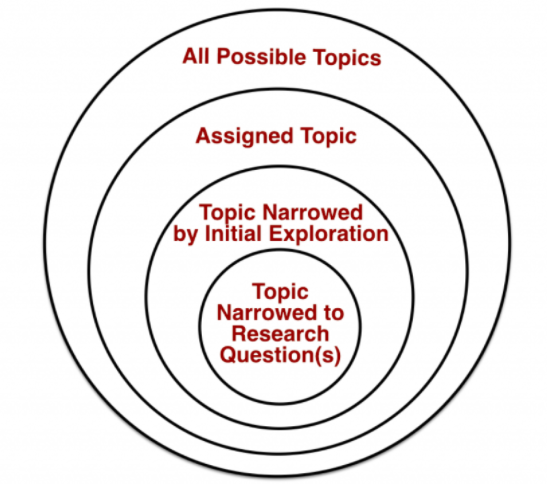Developing a Research Topic
Information Need to Research Topic
You, most likely, have a broad range of interests outside being a student. Families, jobs, hobbies, financial investments, medical decisions—all of these areas are rife with information needs that might require research. However, despite having inspiration all around us, some of the most terrifying words a student can hear from an instructor are: “Pick a topic. It can be anything.”
The first thing to do when picking a topic for an assignment is to take a deep breath and know that you’ve got this! Once you’re ready to concentrate, the second thing to do is to examine the assignment carefully for guidelines. Even the most wide open research assignment should have some parameters that help you narrow your information need. For instance, did the instructor place any restrictions on your topic like identifying things that you can’t write about? Are there requirements around the type of information sources you need to use and how you should incorporate these sources into your work? These guidelines start the process of narrowing.

You start from the outside in, beginning most broadly with all possible topics and slowly narrowing until you reach the Goldilocks topic: not too narrow, not too broad, but just right.
Narrowing Your Topic
When working on narrowing your topic, you should take inspiration from your own interests. What are things you care about? Are you intrigued by an issue that’s been covered in the news recently? Are you able to connect your research to your potential career, current job, or degree/program at COCC? If you’re still struggling selecting or narrowing a topic, you could scan your course textbook for ideas, browse some magazines or newspapers for current events, dive into Wikipedia or another encyclopedia and see what sparks your interest, or talk to your instructor or a librarian for ideas and guidance.
Library Resources for Selecting & Narrowing Topics
Library resources can also play a roll in this stage of your process. The Current Events & Controversial Issues guide links to a variety of tools to help you browse “topic” pages, such as CQ Researcher, Opposing Viewpoints, and America’s News. These resources give general background information on a topic to help you get started as well as provide links to more specific information, something that’s super helpful when you’re looking to narrow your topic. Click through the following images to see where these tools are linked on the Current Events & Controversial Issues guide and what the topic pages look like.
Goldilocks Topic
All this narrowing to avoid a topic that’s too broad means sometimes we overcorrect and get a topic that’s too narrow. Be careful about getting highly specific with your topic because you might find it difficult to locate sources that affect a really narrow audience or that haven’t been studied in-depth before.
For example, say you’re writing about college tuition. That’s a pretty broad topic and you want to narrow it down by exploring the impact of rising tuition on COCC students. That narrow a focus, though, would limit the sources that cover your topic so you might only find information in the student newspaper, the Broadside, or the local city paper, the Bulletin. If your assignment requires you include at least two scholarly sources, you’ve already reached a roadblock. Instead of limiting by location, which might not even be relevant to your search, you could look at large-scale studies across the United States focusing on the impact of rising tuition on all college students.
The bottom line is, you will be working toward a balanced research question that is specific enough to guide you in your research, but not too restrictive.
Activity

